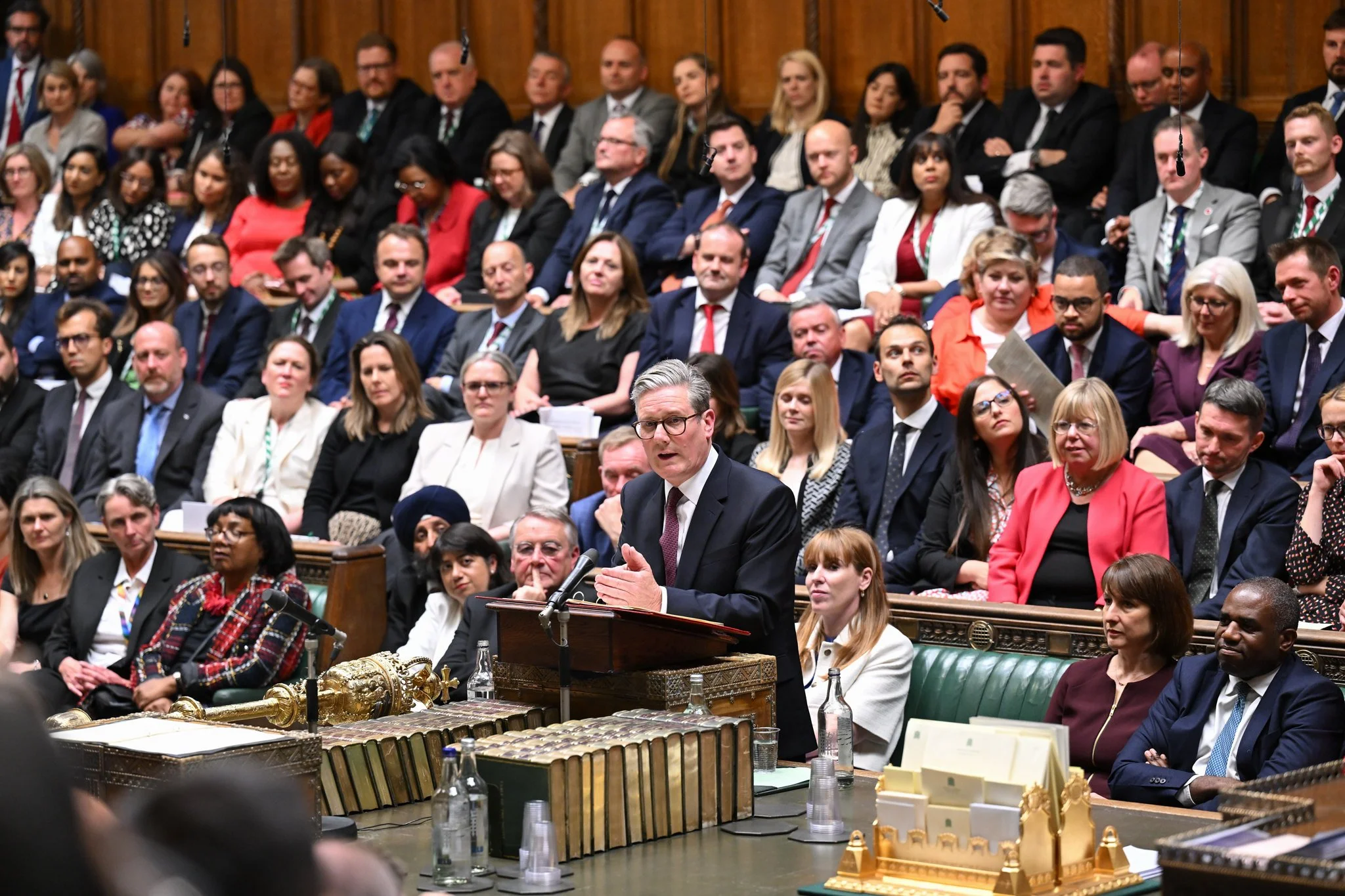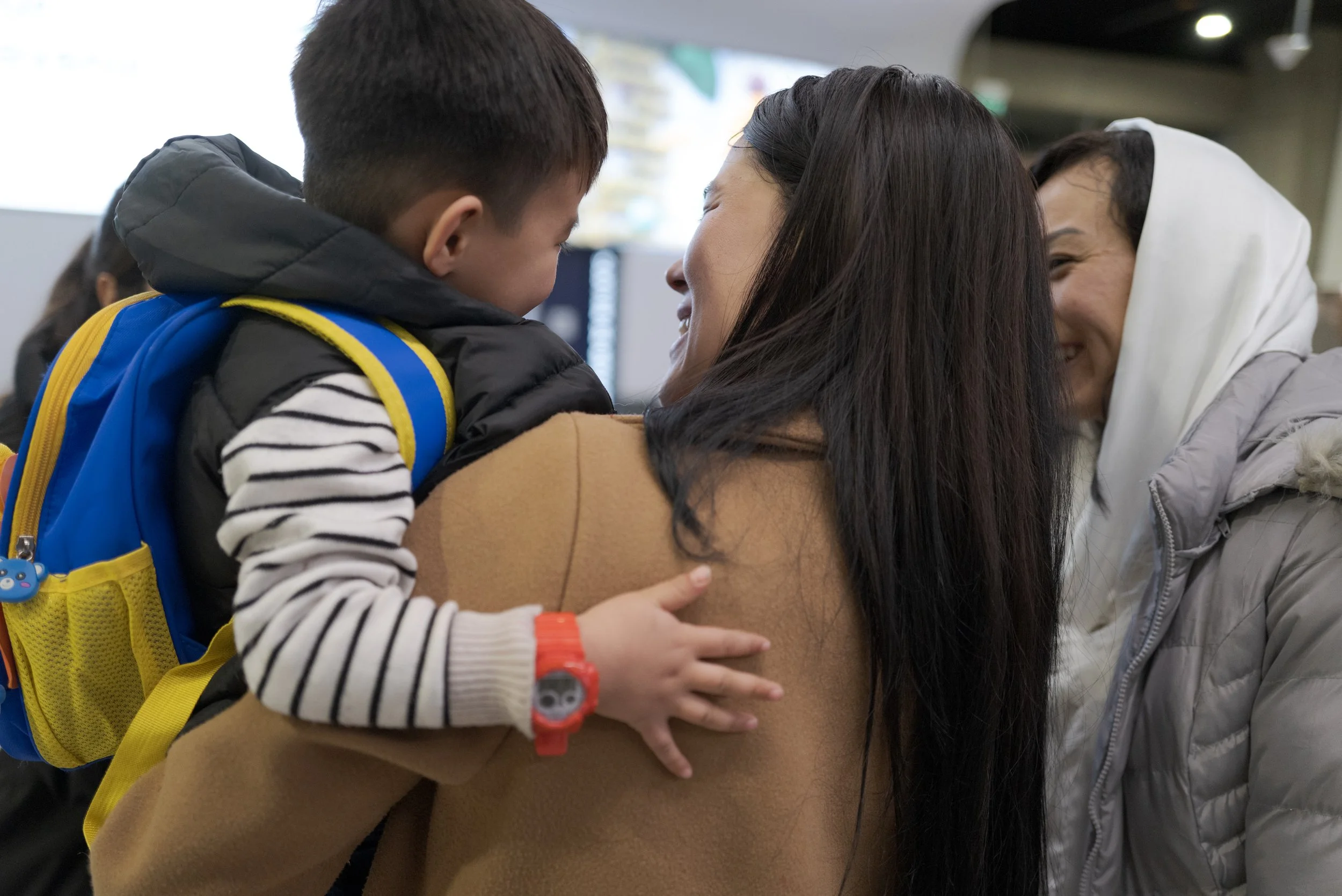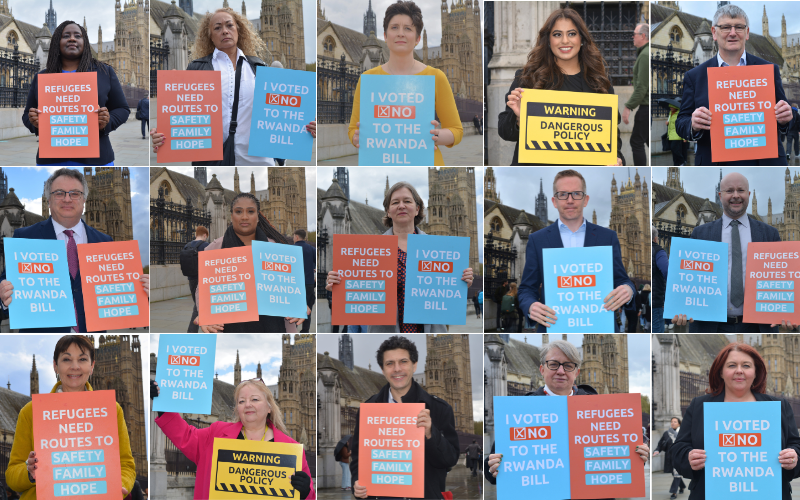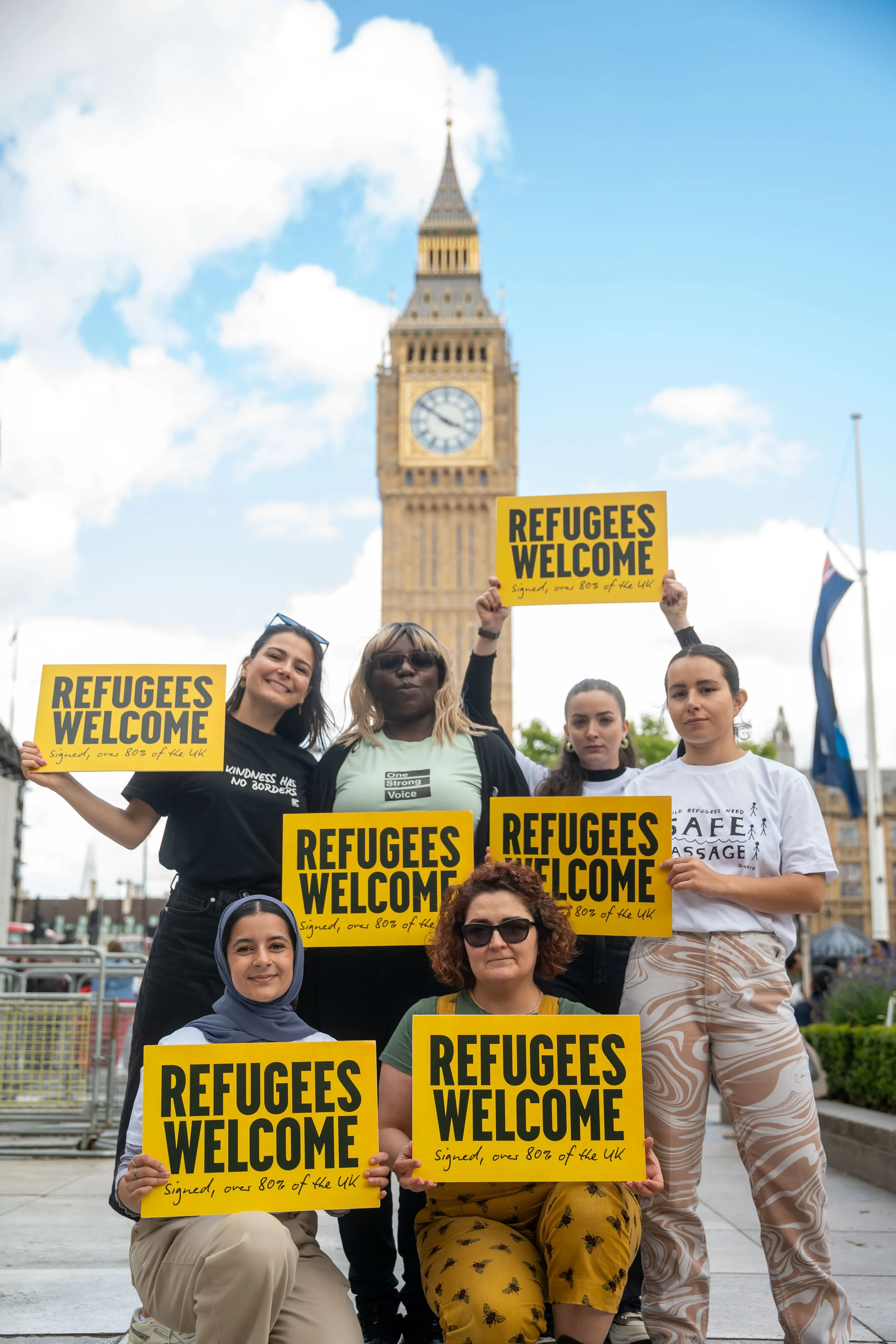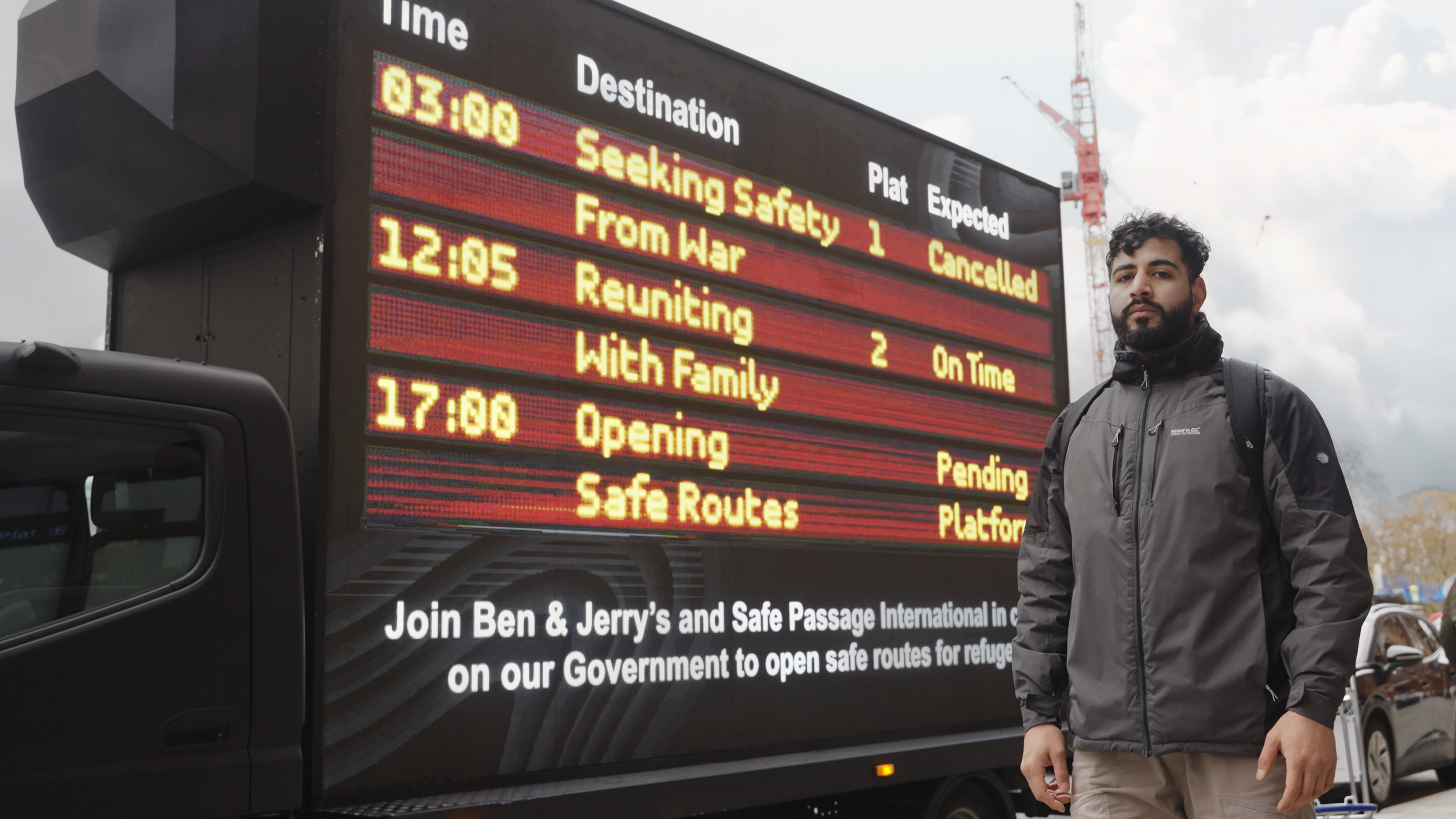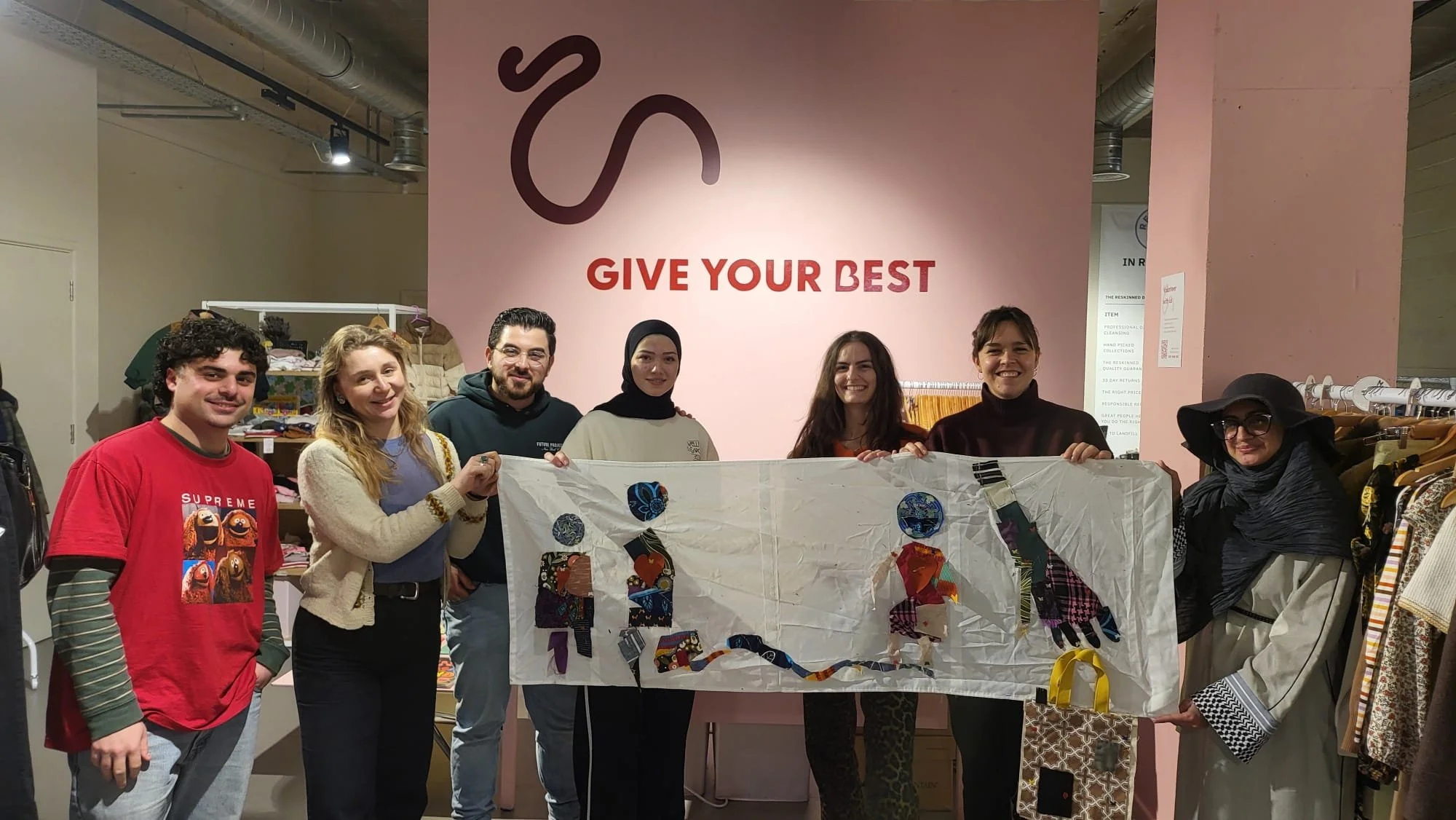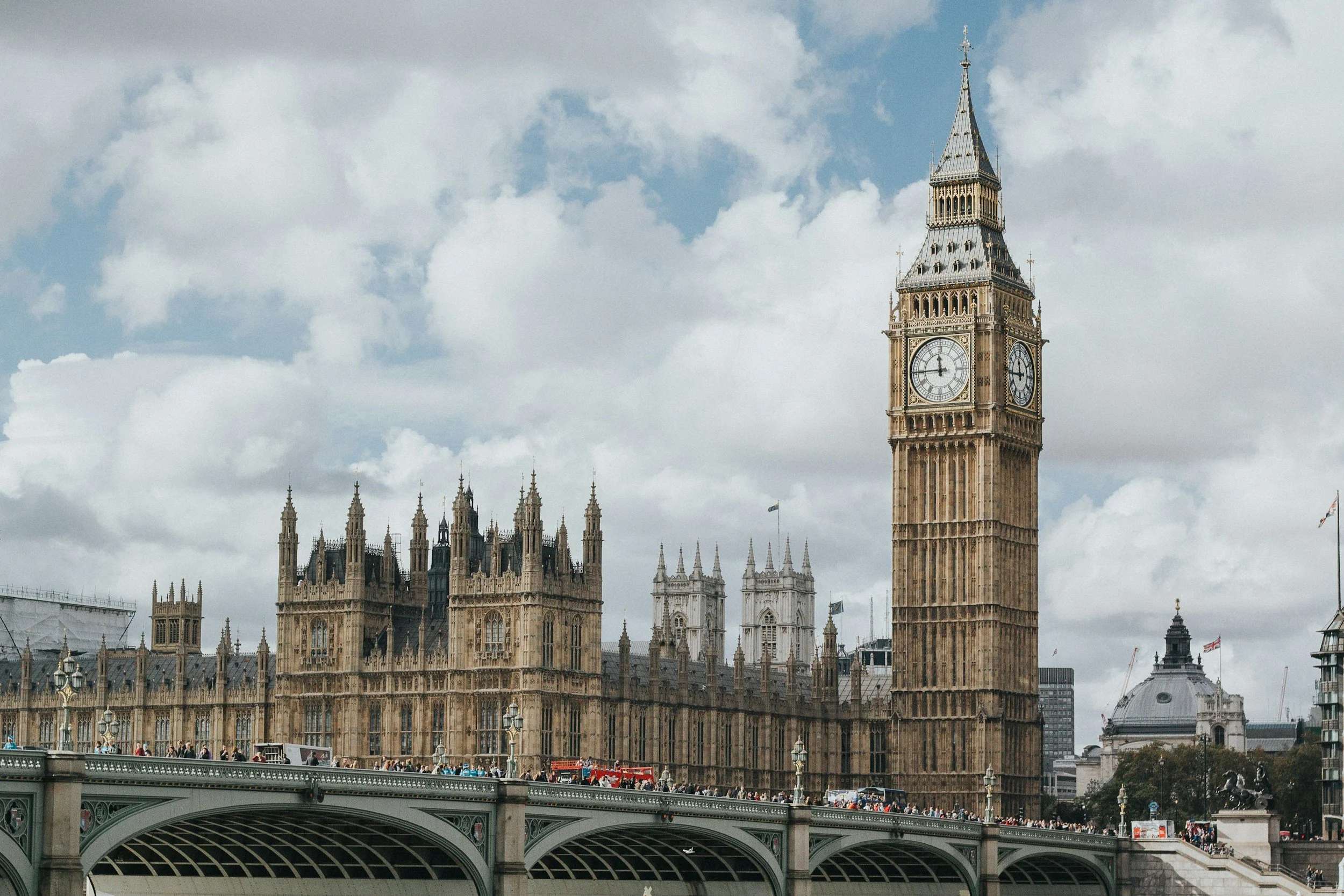Influencing your MP on the Border Security Bill - a step-by-step guide
Campaigning takes many forms—from signing petitions and protesting to creative stunts and artivism. But one of the most powerful ways to drive real change is by engaging directly with decision-makers.
Whether you have five minutes or five hours to give, this guide provides practical tips and tools to connect with your MP and make a difference for refugee families.
Use the quick links to jump to any section, or scroll through for the full toolkit:
✊Getting started
As the Government’s latest immigration bill goes through Parliament, we have a significant opportunity to influence MPs and secure much-needed protections for refugees.
Whether or not you voted for your MP, they are elected to represent you, and they work for you. We need MPs to be bold and speak out for refugee rights and safe routes, including by raising our concerns and solutions in Parliamentary debates or behind closed doors, asking them to support (or oppose!) a Bill or amendments, speaking with other MPs, or pressing Ministers for positive changes.
There are a few ways you can get your MP’s attention, depending on how much time and resources you’ve got. Remember: MPs hold a lot of power, but so do you.
Click on the sections below to find out more ↓
-
Sending a personalised and handwritten letter to your MP asking them to commit to a specific action can be a powerful tool. Even if you’re not up for a face-to-face meeting, you can still hand-deliver it to them for extra impact!
-
As a constituent and a voter, you are able to meet with your MP in person to discuss issues you care about. You could either arrange to go to their surgery, which are regular slots (usually Fridays or weekends) where MPs meet with constituents to hear their concerns, or request a private meeting.
-
Got an event about refugee rights lined up, like a celebration, a vigil or a talk? You can invite your MP to attend it too and hear their local communities’ stories and concerns.
-
MP are usually highly active on social media. Tag them on X, BlueSky or LinkedIn with an eye-grabbing message and try to get as many of your friends to do the same. We’ve included template messages later on in this pack.
We’ll walk you through all of these options in the next sections, so make sure you keep on reading!
🧡Understanding safe routes and family reunion
Immigration policy can be incredibly complex—but you don’t need to be a legal expert to engage with your MP. Still, it can help to have a basic understanding of how safe routes and family reunion work, and why they urgently need fixing.
What’s the problem?
“Safe routes” are immigration arrangements that allow access to the UK for humanitarian reasons. These routes are opened by the UK government so that people can travel officially and safely for the purposes of claiming asylum and getting protection as a refugee. This could be via a visa or permission to come travel to the UK without a visa.
But right now, these routes are extremely limited—and for most refugees, simply don’t exist. That leaves people with no choice but to risk their lives on dangerous journeys.
Here's what you should know:
1
You must be in the UK to claim asylum
There’s currently no visa for seeking asylum. That means refugees can’t apply for protection until they’re physically here—but most can’t get here safely or legally.
2
Most people don’t have a safe way to reach the uk
Most safe routes to the UK, like the Ukraine or Afghan schemes, are limited to specific nationalities. Others fleeing places like Gaza or Sudan have virtually no way to reach safety here, leaving smugglers as the only option.
3
Safe routes save lives
When refugees are given safe alternatives, they will use them over deadly journeys. But right now, there’s almost none. 2024 was the deadliest year on record for Channel crossings, with at least 69 lives lost, including children.
While there have been some significant wins for refugees since the Government came to power, like the end of the cruel Rwanda scheme, they have continued the same security-over-humanity approach.
Recently, we saw the Government ban most refugees from ever getting citizenship and live broadcast deportations on national TV. These tactics are not only ineffective—they dehumanise refugees and fuel division.
The Government’s new Border Security, Asylum and Immigration Bill perpetuates the hostile environment and fails to open life-saving safe routes. Worst, it risks punishing refugees for having no safe way to come here.
💡Find out more about what’s in the Bill below, or read our explainer.
💡Read our safe routes explainer to find out more.
What’s the Government doing?
-
This ends the previous Government’s cruel policy of forcibly sending people seeking asylum to Rwanda. Decision-makers – including judges – are no longer forced to pretend Rwanda is safe.
-
Restrictions that blocked asylum claims and created endless backlogs are being lifted, reopening the door for some people to be heard and protected.
-
This means unaccompanied children cannot be detained indefinitely and can only be detained for very short time periods in special facilities and with certain safeguards.
✅ The good
-
The Government’s framing of migration as a ‘security risk’ is highly problematic and won’t disrupt the smugglers’ business model. Unless refugees have a safe alternative, they’ll still have no other option but to turn to smugglers.
-
This includes measures like indefinite detention with weak judicial safeguards, or the Home Secretary’s right to declare certain countries as “safe” (thereby excluding claims from these countries).
It means our immigration system still builds on the legacy of the last government, and many refugees will still be left in limbo or locked up.
-
The Bill creates new offences around organising boat crossings and further punishes people found to be steering boats.
While targeting smugglers makes sense, some of these offences could criminalise refugees themselves, as they are often forced or pressured by smugglers into ‘helping’ during the journey, including by steering boats.
❌ The bad
Why safe routes matter: Iyad’s story
At just 13, Iyad*’s world was turned upside down when an Israeli airstrike claimed the lives of his parents, siblings, and grandparents. Left severely injured and in urgent need of medical care, his only hope was to join his uncle in the UK.
Iyad was fortunate to be evacuated to Egypt for treatment, where he began the difficult legal process of reuniting with his uncle. After months of challenges and multiple surgeries, Iyad finally arrived in the UK to start rebuilding his life.
But stories like Iyad’s are rare, and most Palestinian refugees face immense barriers to reunite with loved ones in the UK, many simply unable to escape.
*Alias used to protect his identity
what needs to change
Refugees shouldn’t have to risk their lives just to reach safety or reunite with family. We’re calling on the Government to:
Expand family reunion rules so child refugees can reunite with siblings, aunts, uncles, or grandparents—not just parents. This is a lifeline for many children who have no other family left.
Create a refugee visa to give people a safe way to travel to the UK and apply for asylum. Polls show over half of the UK public would support this.
Work with other European countries to build a fairer, more coordinated migration approach and prevent more deadly journeys.
For more information, visit our Routes To Safety campaign page.
🏛️What your MP can do about it
Whether your MP is sympathetic or undecided, there are meaningful steps they can take right now to stand up for refugees. That includes:
-
An amendment on safe routes has already been put forward in the Border Security Bill, and we’re expecting more soon. Your MP can use their vote to support these changes — help them see why these issues matter to their constituents.
-
Your MP can raise the importance of safe routes in Parliament session or in public statements, apply for their own debate or question Ministers on the issue.
-
…or meeting with and/or writing to any other relevant Ministers to share your concerns.
-
Your MP can work with other MPs to build momentum for key amendments and/or push their party to back key amendments.
-
For example, by attending community events, meeting with refugee groups, or sharing your message on social media.
🔔 Did you know? The Border Security Bill will soon move to the House of Lords, where Peers can suggest changes—but it will return to the House of Commons for final votes. That means we have a key window right now to keep the pressure on MPs and make sure they know their constituents expect them to stand up for refugee rights.
Here are some simple, powerful asks you can make when contacting your MP. Feel free to include these in your letter or raise them in your meeting:
➡ Will you vote for amendments on safe routes?
➡ Will you raise my concerns with the Immigration Minister or Home Secretary?
➡ Will you speak in Parliament about why safe routes matter?
➡ Will you attend a meeting with other local constituents/our community group to hear our concerns?
🤝How to engage your MP, step-by-step
In this section, we give you an overview of the different ways you can engage your MPs - click on the sections below to learn more, or just keep scrolling:
💡 Pro tip: Before writing to your MP or asking them to meet, do some research! Use the ‘They Work For You’ website to see their voting record and have a look at their social media pages to find out more about them. This helps provide a picture of who they are, what they’re passionate about, what they’ve advocated for in the past.
Watch our short video for a quick tutorial on researching your MP >>
Writing to your MP (even if you already did)
Even if you’ve already used our quick & easy digital tool to contact your MP, a follow-up message – especially a handwritten letter – can make a big impact.
Why write to your MP?
MPs receive hundreds of standard emails through digital campaigning tools, and while these help show the scale of public concern, a unique, thoughtful letter stands out. It shows you're deeply invested and makes it harder for them to ignore or give a generic reply.
💡 Pro tip: Consider writing a joint letter with multiple signatories, especially if you're part of a local group, community organisation or faith community.
How to structure your letter
The most important thing is that you make the letter your own – your MP needs to understand why this issue matters to you! But we’ve included a suggested structure and some paragraph starters to help you get started. You can also refer to other sections on this page for information about the Bill and safe routes that you might want to share with your MP.
-
Say you’re a constituent (include your postcode!) and briefly share who you are – e.g a parent, teacher, nurse, community volunteer.
→ “I’m writing as your constituent and as someone deeply concerned about…”
-
Mention the new Immigration Bill and your concern for people seeking safety. If relevant, say you’re following up on a previous email or the MP’s reply.
→ “You may have received my previous email, but I wanted to follow up with this personal letter. I was disappointed that your reply did not address the importance of family reunion. I wanted to explain why this matters…”
→ “I’m aware the Government’s Immigration Bill is now going through Parliament and wanted to reiterate my concerns with you because…”
-
Personal stories or local experiences are powerful — mention family, work, values, or your community. If you’ve worked with refugees or seen the impact of family separation, include that.
→ “As a parent, I cannot imagine being separated from my children – and yet many refugees face this every day…”
→ “As a person of faith, I believe we have a duty to…”
-
Be specific and clear, for example:
→ “Will you support the amendment expanding family reunion rights for child refugees?”
→ “Will you write to the Home Secretary urging new safe routes be added to the Bill?”
-
Say you’re keen to know where they stand and ask them to reply to your letter or to meet in person to discuss your concerns further.
Additional tips for impact
Keep it to one page, if possible, but meaningful content matters more than worrying about how long it is
Be polite and constructive, even if your MP has a different view
Avoid jargon – speak from the heart
Mention if you’re writing as part of a local campaign, or alongside others in the area
Make your letter extra memorable by hand-delivering it to your MP’s constituency office or surgery!
Meeting with your MP
Meeting your MP in person can be one of the most powerful ways to influence their views and actions. A face-to-face conversation allows you to share your concerns directly, build a relationship, and ask for meaningful commitments.
Requesting a meeting
There are two ways to meet your MP:
Book a private meeting through their office
Attend a constituency surgery – these are regular slots (usually Fridays or weekends) where MPs meet with constituents to hear their concerns.
Expand the sections below for a step-by-step guide on how to request and prepare for your meeting ↓
-
Find out who your MP is and how to get in touch with them on the Parliament website
Include your full address so they know you're a constituent – MPs often won’t reply without it
Make it personal – explain why this issue matters to you
Keep it constructive – thank them for any past support and be respectful, even if you disagree
Follow up – if you don’t hear after a week or two, send a polite follow-up or call your MP’s office
-
Check your MP’s website or call their constituency office for surgery dates and how to book. You can find constituency phone numbers on the UK Parliament website.
Be prepared to provide a summary of why you want a meeting and your key concerns.
Don’t be discouraged if it takes a few tries – MPs can be hard to pin down, but persistence pays off!
Prepping for the meeting
A little prep goes a long way. Here are some tips on how to get ready for your meeting with your MP:
Do your research. Find out what issues they care about and their voting record. Check out their website, the Parliament website, or They Work For You. Scroll back up for a quick video tutorial on how to use They Work For You!
Understand their influence. Do they have connections in government? Are they part of a committee or hold a party role? They could use these connections to influence.
Know their background. It’s useful to know any past jobs, interests or relevant experience they have. For example, if someone has worked in conflict zones or international development, then you could use that as a hook.
Prepare an agenda and set clear goals. What are your top 2-3 messages and asks?
Practice. Rehearse what you’ll say and be prepared for counter-arguments.
Bring materials, like briefings, reports, or a letter co-signed by your group. Check out our ‘Additional resources’ section.
Who will you bring? If meeting as a group, make sure you prepare together. Agree a game plan, or have a script so that everyone has a role.
You’re in the meeting. What now?
Be friendly and constructive. You are trying to build a relationship with your MP. Find out what their values are and use that to come together on issues. Appreciate them for the things they have done and challenge them on what they haven’t.
Give your MP the chance to respond and listen actively to them. This is a great opportunity to learn what might be holding them back from supporting amendments, or safe routes generally – make sure to write it down so you can respond on the spot or after the meeting.
Come prepared with evidence, statistics and stories (your own, or others’). Providing evidence and real-life accounts will help to persuade your MP that these issues are important and urgent.
Make clear requests and be concise. Be clear on what you want them to do next. Can they commit to making changes? E.g. by voting, raising the issue in Parliament, sharing about the issue on social media, visiting somewhere in your community.
Ask for their insider knowledge. We can ask MPs to help us work out who really holds the power with decision-making. Sometimes a Minister is not the actual person behind a decision, so you could ask questions about who else needs to be influenced and who we need to build a relationship.
Be mindful of time. Meetings are often short, so stay on track. Where possible, try building relationships with staff present too – they can be key allies!
Other ways to engage your MP
Grabbing your MP’s attention on social media
MPs and their teams usually spend a lot of time on social media, so it’s a great tool to share your thoughts with them.
Here are some tips on how to post effectively:
Tag your MP: Most MPs are on Twitter/X, BlueSky or Instagram – tagging them ensures they (and their team) see your message.
Keep it short and clear: Focus on one ask or message at a time.
Include a visual: Photos, graphics, or videos perform better and feel more human. If you’re sharing pictures/videos with others (like your MP), make sure you get their written consent!
Make the most of hashtags: Use our hashtag #RoutesToSafety or #FamiliesBelongTogether to link your messages with others campaigning on this issue.
Be respectful: Even when holding someone to account, a polite tone is more likely to start a conversation.
Tag us on social media so we can reshare your post and help it reach a wider audience! We’re on LinkedIn, Facebook, Blue Sky and Instagram @safepassageintl and X @safepassageint.
💡 Expand these sections for ready-made messages to share with your MP on social media →
-
Dear @YourMP, I’m your constituent and I care deeply about protecting refugee rights. Please support amendments to the new Immigration Bill that protect family reunion and scrap the cruel refugee citizenship ban. #FamiliesBelongTogether
-
We took action in [your town/city] today to say #FamiliesBelongTogether. @YourMP – will you stand with your community and vote to protect refugees’ right to reunite with loved ones?
(Attach a photo of your action, group, or event)
-
I’ve written to/met with @YourMP asking them to support refugee families’ right to reunite and challenge the appalling citizenship ban. I hope they’ll stand with people fleeing war and persecution. #FamiliesBelongTogether
(Or: “Thank you @YourMP for meeting with us to talk about protecting refugee rights and families’ right to reunite.”)
💥 Bonus tips to make your post unmissable:
Use Instagram stories to document your campaign action and tag your MP
Ask a local influencer or community leader to make a post or amplify your message
Create a social media “storm” by getting multiple people to post/tag your MP at once
Share screenshots of your letter or MP response
Creative campaigning
Campaigning can feel intense and overwhelming, and traditional methods like protests aren’t always accessible to everyone. In today’s world, creative tactics are also key to cutting through the noise and making your message stand out.
Why not try something different? We’ve shared some ideas for creative campaigning, but if you’ve got your own, feel free to reach out—we’re here to help!
You can curate a piece of "artivism", i.e. using art as a form of activism. Art is a universal language that can be used to convey a strong political or social message, whether using painting, installations, or the power of words, like the Routes To Home poem our wonderful Young Leaders wrote. If you’re a bit more adventurous, why not project a powerful video somewhere meaningful, like Led By Donkeys did onto the white cliffs of Dover with powerful messages from refugees?
Or you might tap into "craftivism" and produce something beautiful like our Fabric of Solidarity, which our grassroots campaigners stitched together using fabric from different cultures, telling the story of people's heritage and migration and create a striking powerful image for our campaigns.
Not crafty? Everyone has creativity hidden deep inside them, so if arts or crafts isn't your thing, there could be other ways to grab people’s attention - just think outside the box! For example, we recently took to the streets of London with our giant billboard mocking a departure board to highlight the delays and barriers many refugees face trying to reach safety and family.
📢What your MP might say — and how to respond
If you're about to meet your MP, or have already written to them and received a reply, this section will help you prepare for common objections and how to respond effectively.
Take what feels useful, rework it in your own words, and remember: the more personal your argument, the more powerful it will be. MPs are much more likely to listen when they see that real people in their constituency care deeply about child refugees and the need for safe routes.
Click below to see examples of common MP arguments and suggested responses ↓
-
Current safe routes are very limited. Safe routes are designed predominantly around specific wars or crises, with hugely varying levels of success. For example, after the outbreak of war in Ukraine, two safe routes to the UK specifically for Ukrainians were opened and only five Ukrainians have ever made the journey across the Channel, despite over 200,000 Ukrainians arriving safely. The Ukraine schemes are streamlined, well-resourced and flexible and have been shown to effectively break the business model of the smugglers by cutting demand for dangerous journeys.
However, the Afghan resettlement schemes introduced after the Taliban took over Afghanistan in 2021, remain deeply flawed with unfulfilled promises and bureaucratic hurdles that have left so many Afghans in vulnerable positions. The Government committed to resettling up to 20,000 Afghans, but little over half this number have arrived in the UK. The inflexible criteria and inconsistent decision-making as well as limited options for family reunion for Afghans on these schemes, forces many Afghans to make dangerous journeys to family and safety.
Most people have no access to safe routes. For the vast majority of potential asylum seekers in war-torn regions, areas and countries around the world, the only way to claim asylum in the UK is to put themselves at the mercy of the gangs, and to go on a small boat to get across the channel. There is no safe route, for example, for Eritreans or Sudanese people. There is just nothing available. The only means they have to get to the UK are small boats.
Trying to disrupt irregular migration routes without providing safe alternatives only forces refugees to take greater risks. The real issue is that there is no way for refugees to apply for asylum before they’re in the UK, and relying on smugglers is often the only way to get here. That wouldn’t be the case if there were functioning safe routes – and the Ukraine schemes showed this is possible.
-
Family reunion is a key safe route, which is why I’m concerned about how restricted and limited it is. The UK’s family reunion rules are broken and there is a huge gap that we need to address. If a child is orphaned or separated from their parents and has family in the UK, they are prevented from joining a refugee sibling, grandparent or uncle or aunt in the UK.
Previously, a child with family in the UK who was seeking asylum in the European Union (EU) could be transferred to the UK under Dublin III Regulations to have their claim processed here with family, but the UK is no longer party to the Dublin Regulations. While the UK’s own Immigration Rules should also allow for children to safely join family in the UK, this route is largely inaccessible because of huge fees and requirements imposed on the refugee family member in the UK. Right now, this gap is keeping families apart.
Children are particularly likely to resort to people smuggling when access to family reunion is delayed or at risk. Over the past two years, almost 60% of Safe Passage International's new cases of unaccompanied children in France being supported to reunite with family in the UK have gone missing having lost faith in the legal process. To the best of our knowledge, they have made a dangerous journey to reach loved ones, instead of pursuing their claim under slow and restrictive UK rules.
Considering how important family reunion is, as my MP, what will you do to stand up for refugee family reunion and make sure that this safe route is expanded?
-
By opening safe routes, we could act to prevent children risking their lives coming to the UK via dangerous journeys. The changes we are proposing would support a relatively small number of children with estimates of 230-340 children arriving per year. This would go some way towards replacing the safe route lost when the UK ceased to be party to the Dublin Regulations after Brexit, without having to engage in complex state-to-state negotiations. It would also simplify the decision-making process for caseworkers at the Home Office, who would no longer need to assess complex rights-based applications from refugees seeking to demonstrate exceptional circumstances.
As as a global leader, we have a responsibility to support child refugees. These children have family in the UK who can care for them and I would welcome the Government in stepping up, offering sanctuary to those young people. In [add the name of your local area], we are proud to welcome child refugees in our local community.
As my MP, will you support the calls for expanding family reunion?
-
Providing safe routes is the best way to prevent dangerous journeys and tackle smuggling. All the evidence shows that policies that rely on deterrence to prevent refugees from taking dangerous journeys do not work. Such policies do not address why people come here - for family, community, and to rebuild their lives. Most refugees on the move are unaware of policies aiming to deter their attempts to travel. For example, in 2023 and 2024 the government introduced laws which prosecuted people seeking safety, including children, for making channel crossings, but since then almost 55,000 people have crossed the channel, with at least 69 people dying attempting to cross in 2024 alone. Policies which try and punish refugees for making dangerous journeys are therefore not only deeply harmful, but wholly ineffective as a deterrent.
As my MP, will you support the need for safe routes in Parliament and raise the need for the Government to open safe routes for refugees with the Home Secretary?
-
Recent research shows most people still want to welcome refugees, 84% believe people should be able to take refuge in other countries, to escape from war or persecution. Polling after the 2024 election also found that 50% of people backed the introduction of a visa scheme to allow people with strong asylum claims to travel here to claim asylum, with only 16% opposing.
The last Government enacted some of the most extreme anti-refugee policies, yet dangerous journeys didn’t stop. Evidence shows that most refugees do not know what policies will face them when they arrive, and as such do not make decisions about where and how to move based on these.
Besides, this narrative ignores that most refugees don’t want to leave their homes in the first place. The vast majority of displaced people – over 70% – stay in neighbouring countries. The small fraction who make it to the UK often do so because they have family here or language and community ties. Therefore, continuing the same old borders-over-people tactics won’t achieve a different result.
As my MP, will you raise in parliament that many of your constituents want to welcome refugees and expand safe routes?
You’ve got your MP’s attention—amazing! Whether you’ve met them or received a response to your letter, it’s crucial to keep up the pressure and make sure they follow through. Here’s how:
Send a thank-you email. Recap what you discussed, highlight any commitments they made, and include any extra information you promised to send.
Share resources. If your MP is interested in learning more, feel free to include links to our briefings, reports, or factsheets. Need help finding the right one? Drop us a message at campaigns@safepassage.org.uk.
Check back in. If your MP agreed to take action (e.g vote for an amendment, write to a minister, share a statement), follow up a couple of weeks later to check in on progress. Don’t forget to thank your MP if they’ve followed through on their commitments!
Loop in others – If you’re part of a group, share updates with them. It might be helpful to plan a second action or letter if your MP hasn’t followed through.
Let us know how it went! Email us at campaigns@safepassage.org.uk to share how the meeting went and what your MP said. It helps us map out allies in Parliament and refine our campaign strategy.
Be persistent. Change often takes time, and even with your best efforts, you might not get the result you want right away. Stay polite but firm—following up shows you’re serious, keeps refugee rights on your MP’s radar, and helps turn promises into action.
🔥Keeping the pressure on
Make some noise!
Sharing your action publicly helps amplify your message and encourages others to take action too.
Ask for a photo with your MP. If they’ve made a positive commitment (e.g to support an amendment), use the opportunity to thank them publicly and encourage them to follow through.
Bring a sign. Something simple like “Refugees welcome”, “Families Belong Together” or “Safe routes save lives” works well. You can ask your MP to pose with it or hold it yourself in the photo. If they agree, you could even send the image to your local paper.
Sending a letter? Consider handing it over in person (e.g at a surgery), and take a photo of you handing it to them. You could also share a copy of the letter on social media, or film yourself reading it out loud and post the video.
Get consent. Always ask your MP (and anyone else in the photo) for permission before sharing pictures publicly.
Tag us and tag your MP so we can reshare your post and help it reach a wider audience!
📚 Additional resources
You’ve now got everything you need to influence your MP on the Border Security Bill and make sure they know you care about safe routes and refugee rights.
If you’d like to go even further, we’ve included some helpful resources for you to read or print and share with your MP:

